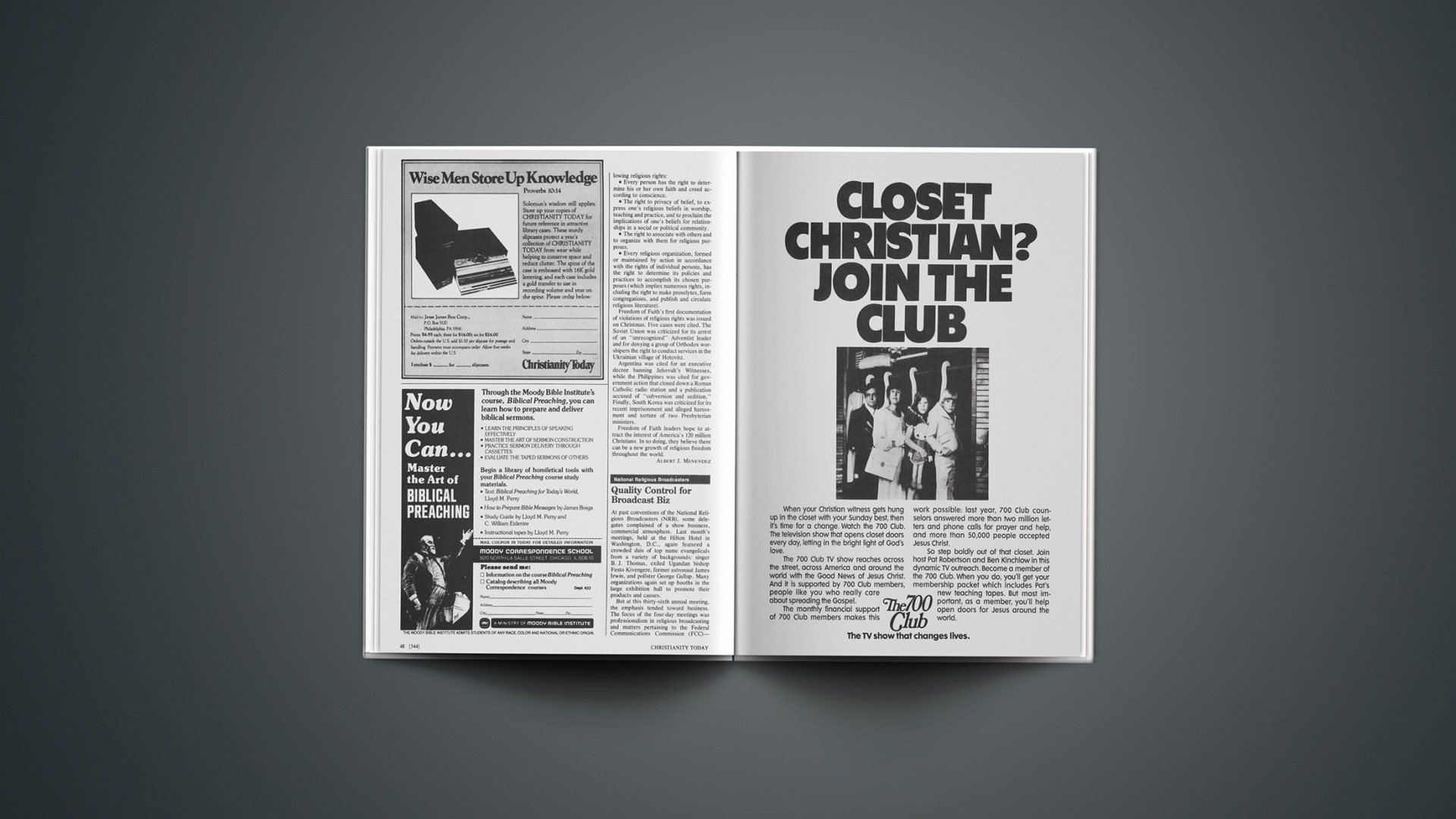At past conventions of the National Religious Broadcasters (NRB), some delegates complained of a show business, commercial atmosphere. Last month’s meetings, held at the Hilton Hotel in Washington, D.C., again featured a crowded dais of top name evangelicals from a variety of backgrounds: singer B. J. Thomas, exiled Ugandan bishop Festo Kivengere, former astronaut James Irwin, and pollster George Gallup. Many organizations again set up booths in the large exhibition hall to promote their products and causes.
But at this thirty-sixth annual meeting, the emphasis tended toward business. The focus of the four-day meetings was professionalism in religious broadcasting and matters pertaining to the Federal Communications Commission (FCC)—important concerns for the 1,400 delegates, but that one secular broadcasting representative, expecting a more flamboyant affair, termed “dull.”
Outgoing president of three years Abe C. Van Der Puy challenged the delegates toward higher quality broadcasting during a major address. Van Der Puy, of radio station HCJB in Quito, Ecuador, said there was still some “huckstering” going on in religious broadcasting, and that the NRB should maintain high standards for membership. (The NRB now includes about 850 organizations, about 60 per cent are radio and television producers and 40 per cent are station owners.) He said that established member stations should be willing to help fledgling members toward higher levels of professionalism.
In keeping with this theme of quality control, many delegates expressed pleasure for their newly elected president, David Hofer, owner of station KRDU in Dinuba, California. Hofer is believed to be the first station owner to become NRB president.
NRB officials invited commissioners of the FCC to a noon luncheon, and commissioner James H. Quello received a standing ovation after his remarks, which called religious broadcasters to a campaign in behalf of broadcasting freedoms. (The delegates later approved a resolution calling for public support for full First Amendment rights for broadcasters as soon as possible.)
Quello, whose son reportedly became a Christian after listening to religious radio programming, called for deregulation of broadcasting (although he does not advocate elimination of the FCC). Quello said that he opposes most governmental controls on broadcasting, citing the Fairness Doctrine as one example of such. He noted that the print media has no doctrine requiring it to give equal space to opposing viewpoints. Neither do newspaper owners renew their licenses to publish through the government, as broadcasters do to maintain their licenses to broadcast, Quello said. (NRB executive director Ben Armstrong said the NRB has never taken a stand on the Fairness Doctrine. He said members are divided on the issue of governmental controls.)
Of special concern to the delegates was the proposed rewrite of the Federal Communications Act of 1934. The proposed bill, also known as the Van Deerlin Bill or HR 13015, would, among other things, eliminate the so-called “public interest standard,” which requires broadcasters to operate in “the public interest, convenience, and necessity.” The rewrite would provide for complete deregulation (removal of governmental controls) of radio and a substantial deregulation of television broadcasting.
Many church agencies have opposed the bill, saying it would put the public at the whims of communication monopolies. (Armstrong said the NRB has opposed most provisions of the bill.) Speaking to concerns surrounding the proposed bill, Harrison Schmitt, ranking member of the Senate Subcommittee on Communications, told the delegates that now is the time to make their concerns heard.
In other convention action, the delegates resolved to go on record in opposition to “blanket licenses” for users of copyrighted music—an issue now before the U.S. Supreme Court. The court will decide whether licensors of music have the right to issue blanket licenses for the right to perform any or all of the compositions in their repertoires in exchange for a negotiated fixed annual fee.
Religious broadcasters, under the blanket license plan, must pay for secular music that they may never use. They have called the plan an example of price-fixing and in violation of copyright laws. As a result, the NRB filed a friend of the court brief against blanket licenses that asserted that the law requires licensors of music to offer per use licenses.
When asked what made this convention distinct, NRB staff member Audrey Langdon said, “We have always had the desire to get out the story of Christ … but now there is an emphasis on the effectiveness in getting that message out.” Perhaps that explains one delegate’s praise for a convention talk given by former astronaut Irwin: “He presented his testimony … without using any evangelical cliches.”










